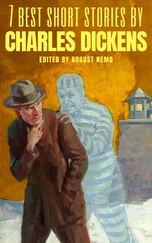Charles Dickens - Dickens' Stories About Children Every Child Can Read
Здесь есть возможность читать онлайн «Charles Dickens - Dickens' Stories About Children Every Child Can Read» — ознакомительный отрывок электронной книги совершенно бесплатно, а после прочтения отрывка купить полную версию. В некоторых случаях можно слушать аудио, скачать через торрент в формате fb2 и присутствует краткое содержание. Издательство: Иностранный паблик, Жанр: foreign_prose, на английском языке. Описание произведения, (предисловие) а так же отзывы посетителей доступны на портале библиотеки ЛибКат.
- Название:Dickens' Stories About Children Every Child Can Read
- Автор:
- Издательство:Иностранный паблик
- Жанр:
- Год:неизвестен
- ISBN:нет данных
- Рейтинг книги:4 / 5. Голосов: 1
-
Избранное:Добавить в избранное
- Отзывы:
-
Ваша оценка:
- 80
- 1
- 2
- 3
- 4
- 5
Dickens' Stories About Children Every Child Can Read: краткое содержание, описание и аннотация
Предлагаем к чтению аннотацию, описание, краткое содержание или предисловие (зависит от того, что написал сам автор книги «Dickens' Stories About Children Every Child Can Read»). Если вы не нашли необходимую информацию о книге — напишите в комментариях, мы постараемся отыскать её.
Dickens' Stories About Children Every Child Can Read — читать онлайн ознакомительный отрывок
Ниже представлен текст книги, разбитый по страницам. Система сохранения места последней прочитанной страницы, позволяет с удобством читать онлайн бесплатно книгу «Dickens' Stories About Children Every Child Can Read», без необходимости каждый раз заново искать на чём Вы остановились. Поставьте закладку, и сможете в любой момент перейти на страницу, на которой закончили чтение.
Интервал:
Закладка:
Worldly wise in hard and poor necessities, she was innocent in all things else. Innocent, in the mist through which she saw her father, and the prison, and the dark living river that flowed through it and flowed on.
This was the life, and this the history, of Little Dorrit, until the son of a lady, Mrs. Clennam, to whose house Amy went to do needlework, became interested in the pale, patient little creature. He followed her to her home one day and when he found that it was the debtor's prison, he walked in. Learning her sad history from her father, Arthur Clennam resolved to do his best to try to get him released and to help them all.
One day when he was walking home with Amy to try to find out the names of some of the people her father owed money to, a voice was heard calling, "Little mother, little mother," and a strange figure came bouncing up to them and fell down, scattering her basketful of potatoes on the ground. "Oh Maggie," said Amy, "what a clumsy child you are!"
She was about eight and twenty, with large bones, large features, large hands and feet, large eyes, and no hair. Amy told Mr. Clennam that Maggie was the granddaughter of her old nurse, who had been dead a long time, and that her grandmother had been very unkind to her and beat her.
"When Maggie was ten years old she had a fever, and she has never grown older since."
"Ten years old," said Maggie. "But what a nice hospital! So comfortable, wasn't it? Such a 'e'v'nly place! Such beds there is there! Such lemonades! Such oranges! Such delicious broth and wine! Such chicking! Oh, ain't it a delightful place to stop at!"
"Poor Maggie thought that a hospital was the nicest place in all the world, because she had never seen another home as good. For years and years she looked back to the hospital as a sort of heaven on earth."
"Then when she came out, her grandmother did not know what to do with her, and was very unkind. But after some time Maggie tried to improve, and was very attentive and industrious and now she can earn her own living entirely, sir!"
Amy did not say who had taken pains to teach and encourage the poor half-witted creature, but Mr. Clennam guessed from the name "little mother" and the fondness of the poor creature for Amy.
One cold, wet evening, Amy and Maggie went to Mr. Clennam's house to thank him for having freed Edward from the prison, and on coming out found it was too late to get home, as the gate was locked. They tried to get in at Maggie's lodgings, but, though they knocked twice, the people were asleep. As Amy did not wish to disturb them, they wandered about all night, sometimes sitting at the gate of the prison, Maggie shivering and whimpering.
"It will soon be over, dear," said patient Amy.
"Oh, it's all very well for you, mother," said Maggie, "but I'm a poor thing, only ten years old."
Thanks to Mr. Clennam, a great change took place in the fortunes of the family, and not long after this wretched night it was discovered that Mr. Dorrit was owner of a large property, and they became very rich.
But Little Dorrit never forgot, as, sad to say, the rest of the family did, the friends who had been kind to them in their poverty; and when, in his turn, Mr. Clennam became a prisoner in the Marshalsea, Little Dorrit came to comfort and console him, and after many changes of fortune she became his wife, and they lived happy ever after.
V.
THE TOY-MAKER AND HIS BLIND DAUGHTER
CALEB PLUMMER and his blind daughter lived alone in a little cracked nutshell of a house. They were toy-makers, and their house, which was so small that it might have been knocked to pieces with a hammer, and carried away in a cart, was stuck like a toadstool on to the premises of Messrs. Gruff & Tackleton, the toy merchants for whom they worked – the latter of whom was himself both Gruff and Tackleton in one.
I am saying that Caleb and his blind daughter lived here. I should say Caleb did, while his daughter lived in an enchanted palace, which her father's love had created for her. She did not know that the ceilings were cracked, the plaster tumbling down, and the woodwork rotten; that everything was old and ugly and poverty-stricken about her, and that her father was a gray-haired, stooping old man, and the master for whom they worked a hard and brutal taskmaster; oh, dear no, she fancied a pretty, cosy, compact little home full of tokens of a kind master's care, a smart, brisk, gallant-looking father, and a handsome and noble-looking toy merchant who was an angel of goodness.
This was all Caleb's doing. When his blind daughter was a baby he had determined, in his great love and pity for her, that her loss of sight should be turned into a blessing, and her life as happy as he could make it. And she was happy; everything about her she saw with her father's eyes, in the rainbow-colored light with which it was his care and pleasure to invest it.
Caleb and his daughter were at work together in their usual working-room, which served them for their ordinary living-room as well; and a strange place it was. There were houses in it, finished and unfinished, for dolls of all stations in life. Tenement houses for dolls of moderate means; kitchens and single apartments for dolls of the lower classes; capital town residences for dolls of high estate. Some of these establishments were already furnished with a view to the needs of dolls of little money; others could be fitted on the most expensive scale, at a moment's notice, from whole shelves of chairs and tables, sofas, bedsteads, and upholstery. The nobility and gentry and public in general, for whose use these doll-houses were planned, lay, here and there, in baskets, staring straight up at the ceiling; but in showing their degrees in society, and keeping them in their own stations (which is found to be exceedingly difficult in real life), the makers of these dolls had far improved on nature, for they, not resting on such marks as satin, cotton-print, and bits of rag, had made differences which allowed of no mistake. Thus, the doll-lady of high rank had wax limbs of perfect shape; but only she and those of her grade; the next grade in the social scale being made of leather; and the next coarse linen stuff. As to the common-people, they had just so many matches out of tinder-boxes for their arms and legs, and there they were – established in their place at once, beyond the possibility of getting out of it.
There were various other samples of his handicraft besides dolls in Caleb Plummer's room. There were Noah's Arks, in which the birds and beasts were an uncommonly tight fit, I assure you; though they could be crammed in, anyhow, at the roof, and rattled and shaken into the smallest compass. Most of these Noah's Arks had knockers on the doors; perhaps not exactly suitable to an Ark as suggestive of morning callers and a postman, yet a pleasant finish to the outside of the building. There were scores of melancholy little carts, which, when the wheels went round, performed most doleful music. Many small fiddles, drums, and other instruments of torture; no end of cannon, shields, swords, spears, and guns. There were little tumblers in red breeches, incessantly swarming up high obstacles of red-tape, and coming down, head first, upon the other side; and there were innumerable old gentlemen of respectable, even venerable, appearance, flying like crazy people over pegs, inserted, for the purpose, in their own street-doors. There were beasts of all sorts, horses, in particular, of every breed, from the spotted barrel on four pegs, with a small tippet for a mane, to the fine rocking horse on his highest mettle.
"You were out in the rain last night in your beautiful new overcoat," said Bertha.
"Yes, in my beautiful new overcoat," answered Caleb, glancing to where a roughly-made garment of sackcloth was hung up to dry.
Читать дальшеИнтервал:
Закладка:
Похожие книги на «Dickens' Stories About Children Every Child Can Read»
Представляем Вашему вниманию похожие книги на «Dickens' Stories About Children Every Child Can Read» списком для выбора. Мы отобрали схожую по названию и смыслу литературу в надежде предоставить читателям больше вариантов отыскать новые, интересные, ещё непрочитанные произведения.
Обсуждение, отзывы о книге «Dickens' Stories About Children Every Child Can Read» и просто собственные мнения читателей. Оставьте ваши комментарии, напишите, что Вы думаете о произведении, его смысле или главных героях. Укажите что конкретно понравилось, а что нет, и почему Вы так считаете.












